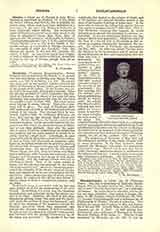

Dioclea, a titular see of Phrygia in Asia Minor. Diocleia is mentioned by Ptolemy (V, ii, 23), where the former editions read Dokela; this is probably the native name, which must have been hellenized at a later time; in the same way Doclea in Dalmatia is more commonly called Dioclea. The autonomous rights of Dioclea are proved by its coins struck in the reign of Elagabalus (Head, Hist. Num., 562). It figures in the “Synecdemus” of Hierocles, in Parthey, “Notitiae Episcopatuum” (III, X, XIII), and in Gelzer, “Nova Tactica”, i.e. as late as the twelfth or thirteenth century, as a bishopric in Phrygia Pacatiana, the metropolis of which was Laodicea. Only two bishops are known, in 431 and 451 (Lequien, Or. Christ., I, 823). An inscription found near Doghla, or Dola, a village in the vilayet of Smyrna, shows that it must be the site of Dioclea, though there are no ruins.
S. PETRIDES

